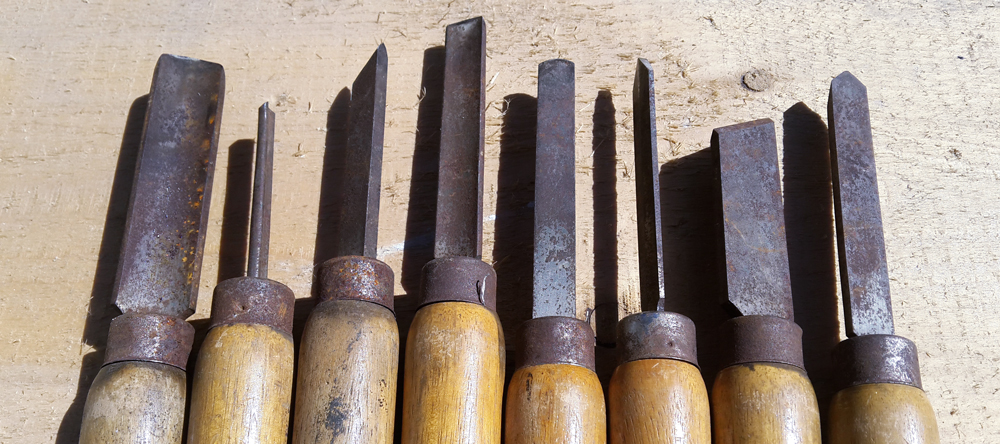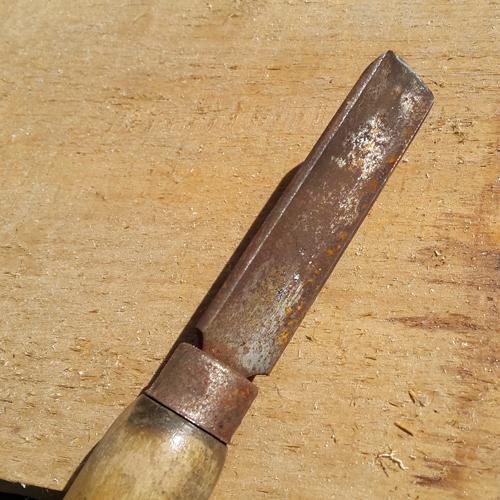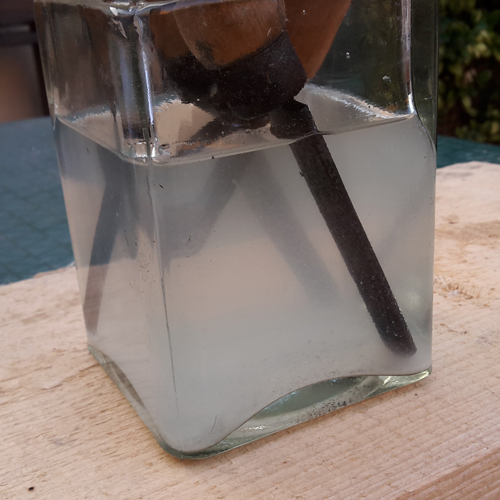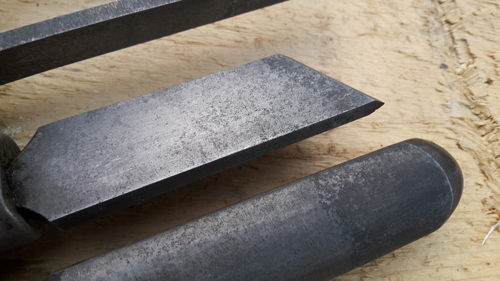Removing rust from your tools.
Most tools are made from steel, strong, durable and built to last. Unfortunately, steel has one major downfall. Like everything it decomposes and in the case of steel the decomposition occurs in the form of rust.
What is rust? Rust is formed when iron (Fe), which is present in most types of steel, reacts with oxygen in the presence of water or air. It occurs through a process called oxidation and science blah blah blah…
Regardless, we’re not interested in what causes rust but rather how to get rid of it with an easy rust removal hack.
So without further ado, the easy rust removal hack is…vinegar.
Vinegar?
Yes, vinegar. Vinegar contains acetic acid which can kick rusts butt.

How does it work?
To demonstrate, I managed to get my hands on an old, some might say vintage, set of woodturning chisels.
If I was planning to use the chisels to incorporate into some sort of rustic display the rust could add some sort of country flair. But I’m not. I plan to use them for woodturning and I don’t like using rusty tools.
So now I have the chisels and I thought to myself…I could go buy some expensive rust remover and in the process knock myself out with the fumes or I could try the vinegar hack. I chose to go with the vinegar, mostly because I already had vinegar and would have to drive to go buy rust remover.
Step 1 – Gear up
What you will need
- Some white vinegar – Enough to fill a container to a point that will enable you to submerge the entire rusted area.
- A container – Big enough to accommodate the tool you want to de-rust.
- Some rags or an old cloth.
- Salt – About two tablespoons.
- A bucket with some tap water (assuming you don’t live Sahara)
- And an abrasive sponge or even steel wool.
Now that you’re armed with all the tools of the easy DIY rust removing trade its time to get down and dirty.
Step 2 – Submerge
After a quick rinse with clean water and a wipe down to remove any loose particles on the surface of the tools they were ready to go into their vinegar bath.
Prepare the pool by pouring enough vinegar into the container to submerge the items and add two tablespoons of salt.
Some more science: The acetic acid in the vinegar and the salt react to form sodium acetate which is the much weaker little brother of hydrochloric acid.
Place the objects inside the pool and go on with your life for the next 24 hours. Give the vinegar time to do its job. The longer you leave it in, the better.
Step 3 – Scrub it up
So its been 24 hours and you’re dying to see if vinegar can remove rust from steel.
Removing the tools you  should notice the rust lifting from the steel and with a light scrub with the steel wool it should come right off.
should notice the rust lifting from the steel and with a light scrub with the steel wool it should come right off.
Make sure you get all of it and follow the process with a good rinse to wash off the vinegar left on the tool and using a rag dry it off.
Viola, you de-rusted an old tool. Simple as that.
At this stage, it might be a good idea to give te tool a good oiling as to prevent the return of the rust monster. Using a rag rub some oil on all the steel areas of the tool. Even WD-40 should do the trick. Oiling the tool prevents water (the rust catalyst) from making contact with the steel. No water means no rust.
 Woodworkjunkie.com, DIY like a pro.
Woodworkjunkie.com, DIY like a pro.
If this article was helpful or you have any suggestion or questions please leave a comment below.

I never knew that vinegar can be so effective for removing rust.
You recommended a light scrub however we have a vintage piece of equipment. Do you think I should use “harder” scrub for removing rust or would hard scrub hurt it?
Hello Furkan
The idea is that the vinegar does all the hard work for you.
By the time the tool gets removed from the vinegar bath, the rust tends to be so soft you can actually rub it off with a towel. This means that although a more aggressive scrub won’t damage your tool, it probably won’t make much difference.
In the case of your vintage tool, I would suggest repeating the rust stripping step. This means after completing the entire process place the tool back in the vinegar for another 24 hours.
Hope this is helpful.
Jean
great post and I had no idea that vinegar could do that too. It never ceases to amaze me the growing list of things that vinegar can do. nice post and instructions on how to get rid of that pesky rust.
Hey Brent.
Yes, vinegar can preserve food and strip rust. Quite versatile if you ask me.
Very happy you enjoyed the post.
Check back soon as we have many interesting posts’s still on their way.
Jean
Wow, this is a great DIY Jean. Like the others who commented, I didn’t know Vinegar can actually do that. I remember few years back when I was trying to take out the rust from an old bike. It took me forever applying a liquid I bought from a store but it was futile. Had I known what you just shared, it would have saved me both money and time. Thanks for this. Now, I’ll try this out on some of my stuff.
JR
Hi JR
The vinegar hack is a very nifty trick to remember and as you can see from the photos it works just as well as store-bought rust remover chemicals. The only downside being the time the object needs to be submerged.
Best of luck
Jean
Vinegar is a rust removal hack?!? Ingenuis. I learnt something new today, that’s fr sure.
Also learned some science on your article about the “little brother” of hydrochloric acid.
In terms of salt, would a particular type of salt work better?
Also, would you suggest doing this on a regular to tools before they catch rust as a way of PREVENTING rust all together? If so, what is a good time frame to follow? Maybe every 6 months according to how much I use the tools?
Thanks for the great article. Loved the clear step by step instructions along with the descriptive pictures.
This hack is too easy not to use!
Keep up the great work!
Janakhan
Hi Janakhan.
In terms of preventing rust, the vinegar bath is to strip of rust. It won’t prevent future rust from occurring.
The best way to prevent tools and steel objects that can’t be painted from rusting would be an oil treatment.
It would be a good practice to take all your metal tools on a 6-8 monthly basis and give them a good clean and oil them up afterward.
The oil prevents rust by displacing any water that comes into contacts with the tool.
Hope this is helpful.
Jean
Hi Jean,
I really liked your post. I liked that you brought some humor in it. Especially when you started explaining what rust is. I used to do wood work on Clocks, Street sign (numbers on houses), and wood carving. Whenever I got rust on my tools, I was unaware how to fix them so I threw them away. It did give me an idea that I am going to try. I have a couple cookie sheets with rust (from scrubbing them to death). I am going to try it on them. Great post. Very enjoyable. Made me laugh. Look forward to reading others.
Reggie
Hi Reggie.
I’m very happy that you enjoyed the post.
Check back soon. We have some fun and informative content still on it’s way.
Jean
Wonderful post! I had no idea that vinegar could remove rust from steel tools. Now I know. Thanks for posting this article.
Hi Chris.
Thank you for your comment.
Happy crafting.
Jean
Great article, thank you.
I’m off down to the supermarket to buy vinegar lol, funnily enough don’t have any in the house.
What about Coke, thought that did same job?
Cheers
Hi Mark.
Yes, Coke also has a low pH and although I haven’t tried it, it should produce similar results.
Thanks for your comment.
Jean
Love this hack! I’m hoping it will work on my kitchen scissors as well. Can’t hurt to try, right? I appreciate knowing the science behind this, too. My brother works with a lot of tools, not for woodworking, but for cars and planes, so I’m going to pass this along to him. BTW, I really like this site. Wish I had the time to learn more about working with wood. I just love the look! Best wishes!
Thank you for your lovely comment Suzi, we’re very pleased you like the site.
I’m quite confidant that this hack can work for your scissors as well.
Regards.
Jean
This site is right up my ally as I recently started a property maintenance company here in London. Great place to come for advice. Somewhere I can send my customers as well.
Hello, Jaco.
The more the merrier.
We have a lot of great content on its way. Hope you and your customers can find value in it.
Jean
Hey Jean
Thanks for the tip, now I can restore all my old rusty tools that I thought were redundant because rust removers are pretty expensive.
Gary
Hello Gary
Glad to help.
Jean
I am sending this article to my husband right now! Thanks for the tip.
Hi Cindy
Always a pleasure!
Wow Vinegar? I never would have known that. II have rusty tools sitting out in the shed, I can now re purpose them to what they are supposed to do instead of just sit in the box.. Great Information, I have learned something new today. I book marked and will be back as I like other content on your site as well.
Thanks for the information
Hi Todd,
That’s great to hear.
Happy woodworking and see you soon.
Jean
Best way to keep tools from rusting, keep them dry, keep them away from moist air. So not in the outside shed. Don’t store them in cloth or leather holders.
I found it interesting when you mentioned that vinegar is really effective when it comes to removing rust. Would it be best to prevent rust from growing in the first place? I would think that preventing rust from growing would be cheaper and easier than trying to remove it.